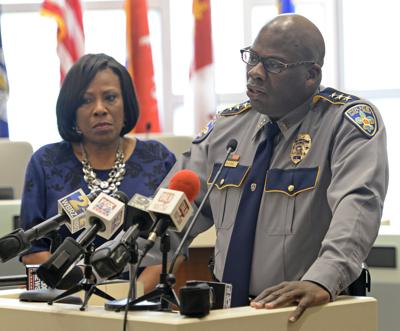Citing significant improvements in the hiring and promotion practices of Baton Rouge's fire and police departments, a federal judge on Tuesday lifted a consent decree imposed 39 years ago seeking to decrease discrimination against black and female applicants.
The U.S. District Court for the Eastern District of Louisiana lifted the decree, issued in December of 1980, noting the departments' hiring and promotion practices are now in compliance with federal law. The city had filed for the dismissal.
Mayor-President Sharon Weston Broome said Baton Rouge Fire Chief Edwin Smith and Police Chief Murphy Paul have worked tirelessly to diversify their ranks.
She also said her administration has worked hard to promote inclusive hiring practices.
“What that means is we want to tap into all the talent across gender, race — you name it,” she said. “We want to hire individuals for our administration, specifically the police and fire departments in this case, from throughout the city so that no matter where they live, we’re touching demographics that represent Baton Rouge.”
Paul on Tuesday acknowledged there’s still more work to do to ensure the Police Department’s racial and gender demographics properly reflect the community it serves.
“This is just government recognizing there has been progress,” Paul said. “We’re still committed as an agency to make sure recruitment and hiring procedures are in alignment with best practices.”
“We are intentional in becoming an exceptional law enforcement agency,” he added.
Paul sees the dismissal of the decree as another win this week for his department, following Monday’s decision by state lawmakers who approved an overhaul giving him more discretion promoting officers into leadership positions within the police department.
Smith said his department will also continue to build and improve the processes it implemented leading up to the milestone.
“Our goal is to always provide Class One service to our residents,” Smith said in a prepared statement. “Inclusive recruiting practices are essential to meeting our workforce needs.”
The original consent decree spanned the state, including almost 40 municipalities from Shreveport to Sulphur, Bastrop to Harahan. But in the last decades the vast majority of those cities have been released from the decree, some as early as 1998 and most in 2012.
The consent decree, the result of litigation that began in Louisiana in the early 1970s, required regular submissions of paperwork to the Justice Department about hiring practices.
The consent decree prohibited the municipalities from discriminating on the grounds of race or sex; its guidelines called for hiring an equal number of white and black police and fire recruits. It also required the departments to jettison titles like "policeman" or "fireman" in favor of gender-neutral terms such as "police officer and "firefighter."
As a long-term goal, the departments were to try to hire a force representing the proportion of black people and women in the local labor force, subject to the availability of qualified applicants.
While the decree was in place, both departments had to undergo periodic evaluations and audits to ensure they were making efforts to comply with the consent decree, said Police Departments spokesman Sgt. L'Jean McKneely.
He said the Police Department started making a hard push to meet the federal guidelines at the start of former police chief Jeff LeDuff’s tenure.
When Paul first took helm of the city's police force — a department still struggling to build trust with the black community following the July 2016 officer shooting of Alton Sterling — he vowed that addressing the consent decree would be one of his top priorities.
The police department's most recent class, which started basic training in March, is almost 60 percent black and includes four women.
As of May 2019, 34.4 percent of the Police Department’s 636 officers are black, 63.5 percent are white, and 2.1 percent identify as another racial minority. And 90.9 percent of the department’s officers are male and 9.1 percent female.
For the fire department, 27 percent of its employees are black, about 72 percent are white, and 1 percent are classified as “other.” The department has nine black females and 20 white females.
Neither Murphy nor Smith got into specifics regarding the policies and procedures that went into diversifying their ranks over the years. But Paul said the push toward community policing is the factor he credits with the most in diversifying the racial makeup of its academy classes.
“When we begin to break down the barriers with community policing, (residents) begin to trust the police department and like the direction we’re going in and then you get more young people from the community wanting to join the force and be a part of BRPD.”
The Baton Rouge Police Department remains far from reflecting the racial makeup of the city its officers serve, despite decades of federal ove…






